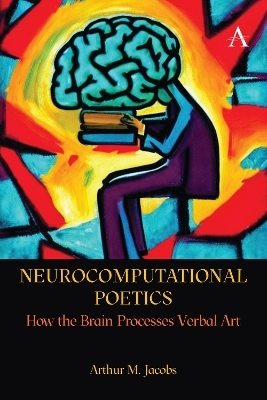
Neurocomputational Poetics
Anthem Press (Verlag)
978-1-83998-770-0 (ISBN)
This book introduces a new thrilling field: Neurocomputational Poetics, the scientific ‘marriage’ between cognitive poetics, data science and neuroscience. Its goal is to uncover the secrets of verbal art reception and to explain how readers come to understand and like literary texts. For centuries, verbal art reception has been considered too subjective for quantitative scientific studies and till date many scholars in the humanities and neurosciences alike view literary reading as too complex for accurate computational prediction of the neuronal, experiential and behavioural aspects of reader responses to texts. This book sets out to change this view.
Arthur Jacobs is Professor of Experimental and Neurocognitive Psychology at Freie Universität Berlin (FUB). He is (co-)author of more than 250 scientific publications in the fields of reading research, psycholinguistics, affective neuroscience and neurocognitive poetics, among which is the book Gehirn und Gedicht (Brain and Poetry, 2011; with R. Schrott).
Acknowledgements; Preface; 1. Introduction: The Two Boons of an Unnatural Daily Activity; 2. Models and Methods; 3. Text Analysis; 4. Reader and Reading Act Analysis; 5. Computational Poetics I: Simple Applications; 6. Computational Poetics II: Sophisticated Applications; 7. Neurocomputational Poetics I: Upper Route Studies; 8. Neurocomputational Poetics II: Lower Route Studies; 9. Conclusions; References; Index
| Erscheinungsdatum | 17.08.2022 |
|---|---|
| Reihe/Serie | Anthem Studies in Bibliotherapy and Well-Being |
| Verlagsort | London |
| Sprache | englisch |
| Maße | 153 x 229 mm |
| Gewicht | 454 g |
| Themenwelt | Geisteswissenschaften ► Psychologie ► Allgemeine Psychologie |
| Geisteswissenschaften ► Psychologie ► Verhaltenstherapie | |
| ISBN-10 | 1-83998-770-7 / 1839987707 |
| ISBN-13 | 978-1-83998-770-0 / 9781839987700 |
| Zustand | Neuware |
| Informationen gemäß Produktsicherheitsverordnung (GPSR) | |
| Haben Sie eine Frage zum Produkt? |
aus dem Bereich


